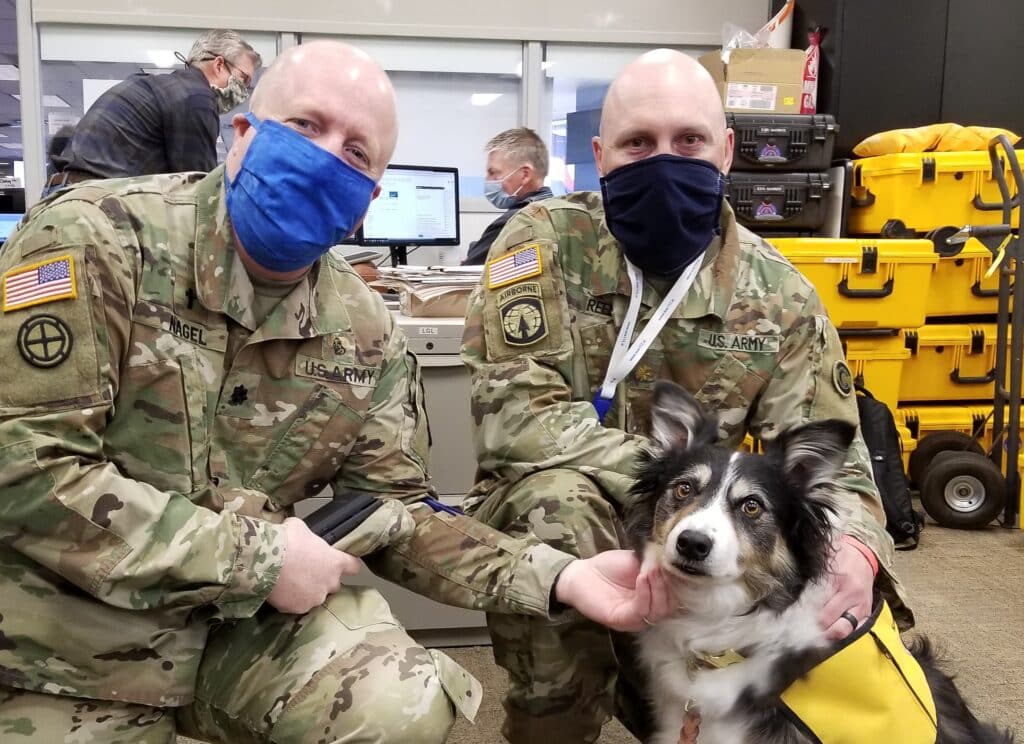



The Pet Partners Therapy Animal Program has been dedicated since the beginning to bringing therapy animals to people who can most benefit. For more than three decades our dedicated volunteer teams have been bringing the power of the human-animal bond to people in healthcare settings of all kinds. As the effectiveness of animal-assisted interventions has been demonstrated through research, we’ve watched that impact expand into other areas, including schools and campuses, workplaces, transportation facilities, and more.
One of the things that has kept our Therapy Animal Program vital is our ability to respond to developments in the field of AAI and bring therapy animals to new applications. In recent years there’s been increasing call for therapy animals to respond following crisis situations, including disasters resulting from natural forces or technological failures, and tragedies such as mass shootings or unexpected deaths in a community. Responding to crisis can also mean supporting people who have experienced trauma in many forms.
With this increase in demand for support in the wake of crisis and trauma, Pet Partners determined that it was time for us to create an animal-assisted crisis response program, and to provide specialized training for our volunteers, so that we can better serve people in the wake of crisis, and provide additional support for the welfare of handlers and therapy animals doing this work. In October 2019, we launched our animal-assisted crisis response program.
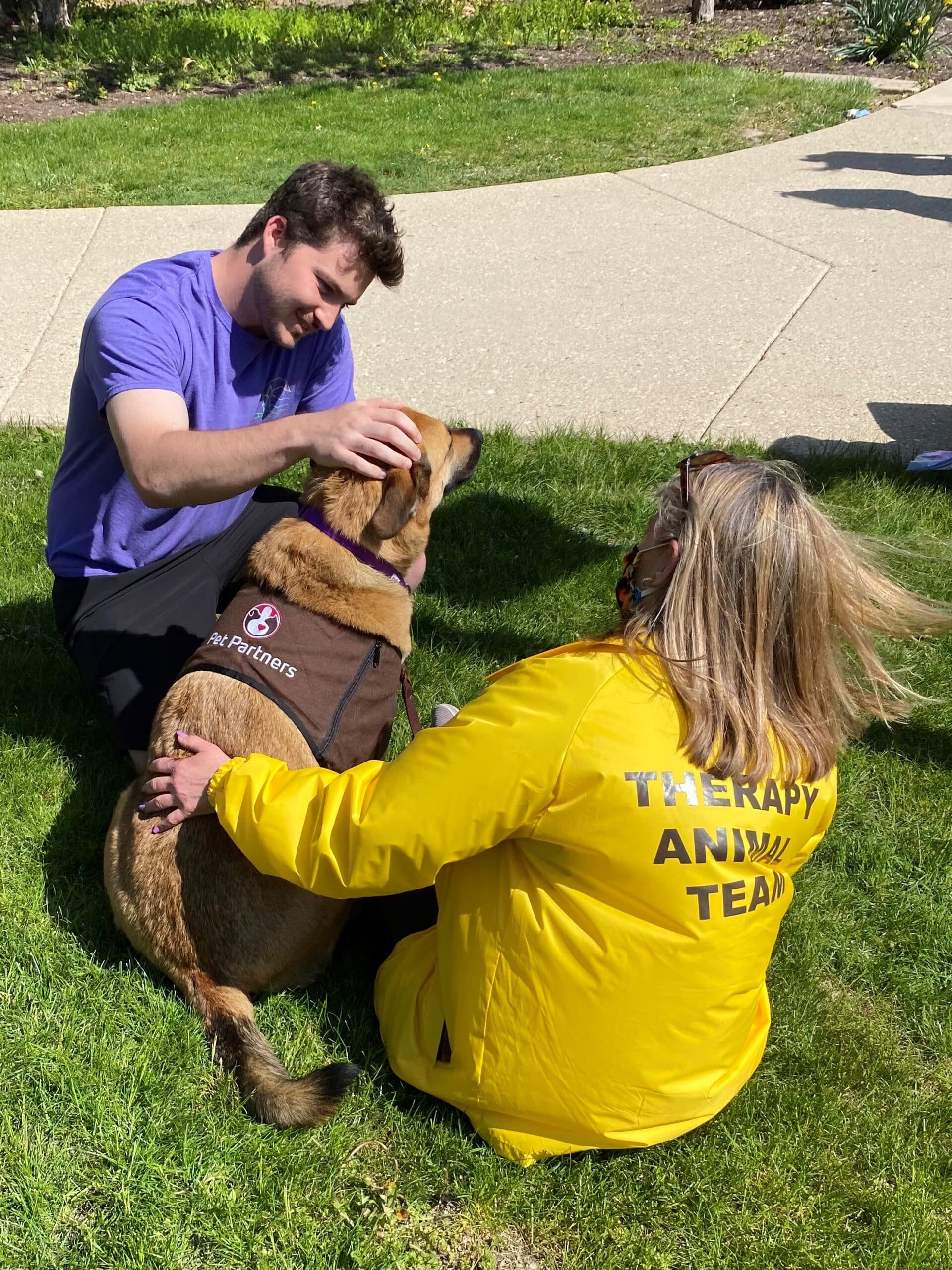
Animal-assisted crisis response (AACR) is a class of animal-assisted activities (AAA) which provides comfort to those who have been affected by natural, human-caused, or technological disasters.
AACR is effective because the safety, familiarity, novelty, and interest in the animal have been found to be impactful when building rapport with a person affected by crisis. The therapy animal team can offer comfort, reduce anxiety, and provide the opportunity for contact and engagement, and when needed, connect a client to emergency personnel and professionals for additional assistance.
AACR is not a professional mental health intervention. Pet Partners AACR handlers must complete training which includes psychological first aid concepts, sometimes also referred to as mental health first aid. Psychological first aid is a form of stabilization. Stabilizing individuals results in an environment where recovery can occur. AACR does not take the place of professional interventions, but provides support through listening, empathy, and sharing the unconditional love of a therapy animal.
Working dogs have been involved in responses to crisis situations for many years. Search and rescue dogs have long assisted in the wake of disasters such as earthquakes and the 9/11 attack on the Twin Towers in New York. This was the most common kind of animal-assisted crisis response for many years, and what many people would think of when they thought about animals responding to disasters.
As animal-assisted interventions became more common, many professionals working in the crisis and trauma response fields started to see the value of canine-assisted responses that address the mental and emotional health of people affected by disasters. Both professionals and volunteers trained their dogs and educated themselves about how best to respond to the psychological component of disaster response, and the overlap with therapy animals became obvious.
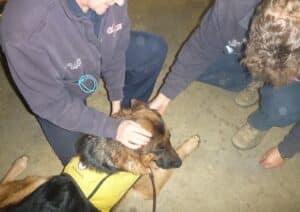
Over the past decade, animal-assisted crisis response has increasingly come to mean the presence of therapy animals to help people who are dealing with trauma in the aftermath of a disaster or crisis. In many circumstances it will mean a large event like a hurricane or mass shooting. It can also mean assisting people who are in personal crisis as the result of violence or abuse, as well as people who are themselves assisting others in crisis—for example, support of workers who have been involved in caring for people during the COVID-19 pandemic. The emphasis now is on handlers and therapy animals being able to provide what’s called “psychological first aid,” helping people deal with the initial shock and impact of a crisis event, and providing comfort and calm through the presence of an animal and a reliable handler.
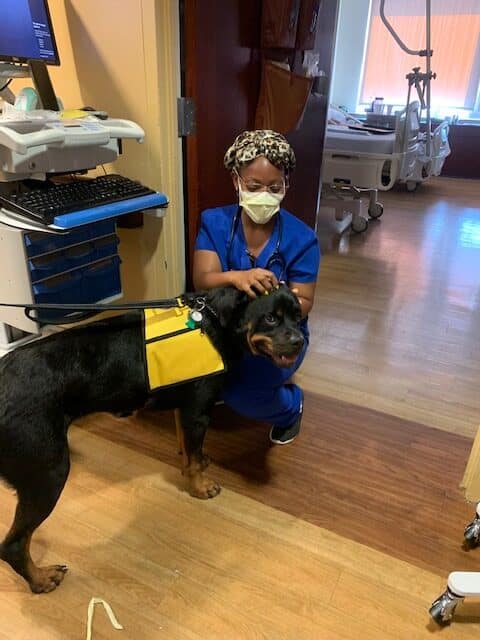
Pet Partners has seen an increase in our therapy animal teams assisting their communities in the aftermath of a variety of crisis and disaster situations. These situations cover a broad range of types and scale, including support for communities after mass shooting events; working with insurance companies at mobile relief sites after hurricanes, tornadoes, and wildfires; comforting students and faculty after unexpected tragedies at local schools; and collaboration with first responders, local law enforcement, and court facilities. Many of these responses take place in settings where our therapy animal teams already visit, including schools, hospitals, and workplaces. One recent AACR development has been teams working with healthcare facilities where they visited regularly prior to the COVID-19 pandemic to provide support for staff who have experienced intense stress and ongoing trauma due to the effects of the pandemic.
The best way that Pet Partners can serve our volunteers in this realm is to provide training and education that supports them in providing this vital work to their communities, which many teams are already engaging in even without such training. We also believe that animals other than dogs can provide the calm, comforting presence that makes AACR valuable; while AACR has typically involved only dog teams, Pet Partners teams of all our registered species have the option to earn an AACR credential.
Our goal in developing our own AACR credential was to bring the rigorous standards and excellent handler education that are already foundations of our Therapy Animal Program to the needs of AACR. Our commitments to safe and effective visits and animal welfare remain paramount in our AACR credential and education. We consulted extensively with subject matter experts to develop our coursework, curriculum, and requirements.
The Pet Partners AACR coursework covers the following information:
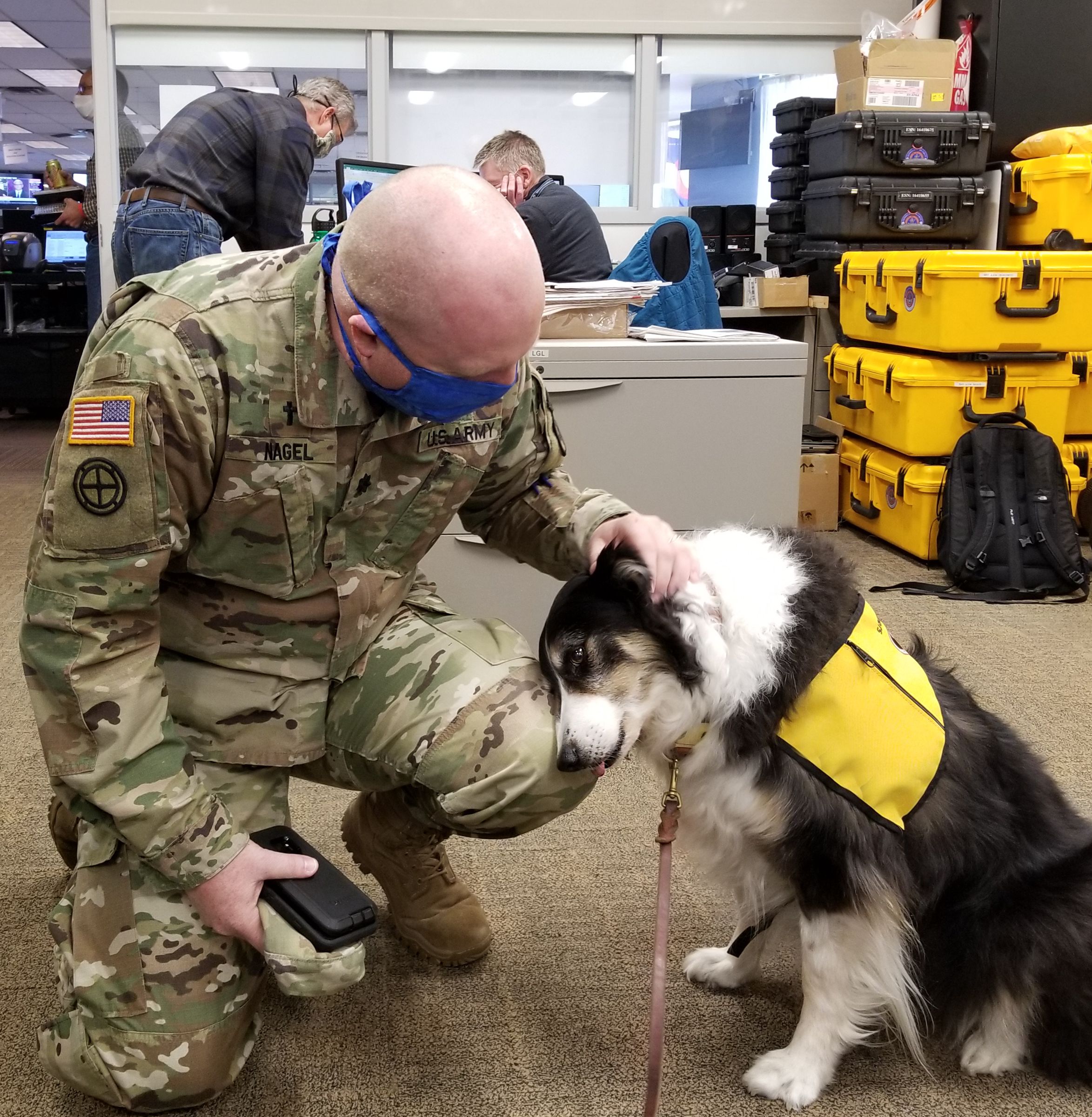
By covering this material in a role-playing–style course, we aim to give handlers the opportunity to think about the different ways they’ll respond to different situations and practice those skills. Additionally, Pet Partners AACR teams will also complete free online training offered by the Federal Emergency Management Agency (FEMA) as part of their AACR application, to ensure they are prepared for the logistics of crisis response situations.
One decision made after consulting with experts and carefully considering our approach to AACR was to not require a second evaluation for AACR work. The majority of crisis response work happens when the community is in recovery and the physical location is safe and secure. Many crisis response locations are settings that our teams already visit in. For that reason, we felt that intentional exposure to sirens and other extreme situations designed to elicit a stress response was neither necessary nor aligned with our philosophy of You Are Your Animal’s Best Advocate (YAYABA™).
Dr. Leslie Stewart, a clinical therapist who has an extensive background in trauma-informed therapy and who works with therapy animals as part of her practice, notes that we sometimes overemphasize the animal in AACR and undervalue the work of the handler. According to her, training for the handler is the most important aspect, because the handler will guide how people affected by crisis interact with the animal, which can determine how effective the interaction will be.
The concepts and education covered in the coursework can also be valuable in non-crisis settings. Many Pet Partners teams visit in what are considered more typical AAI settings with clients who have experienced crisis in the past or in non-disaster situations. The education handlers receive for AACR can be useful in working with these populations as well.
Pet Partners registered teams who want to receive AACR training and credentials must already have at least six months of general visiting experience in order to register for AACR. This requirement helps ensure that teams already have a solid base of visiting experience in non-crisis settings and that handlers will know how to implement YAYABA effectively.
Deployment protocols for AACR also reflect our focus on rigor and team welfare. Pet Partners AACR teams should never self-deploy, but instead will be required to wait for invitation and details about the deployment. Teams will be deployed to settings that are in line with their team qualification ratings. The two-hour daily limit on visiting time remains in place for AACR deployments; the purpose of the time limit is to minimize stress and fatigue for animals and handlers, and reduce the risk of negative responses. Crisis situations can exacerbate these factors, so holding to the time limit will reduce the possibility of incidents and allow both handlers and animals more recovery time.
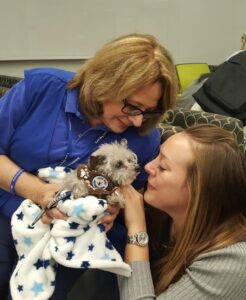
Another aspect of welfare is for handlers to consider conditions and safe transit during AACR situations. There may be times when it would not be safe for teams to commute to crisis response locations, or where environmental conditions (such as smoke from wildfires or damage to infrastructure) would put the health of handlers or therapy animals at risk. Our AACR training reinforces that YAYABA applies to these situations as well; handlers should always consider these aspects of AACR when deciding whether to deploy, and should never put their own well-being or that of their therapy animal at risk by responding.
And Pet Partners AACR teams work primarily within their communities. The model in which therapy animals are put on planes and travel long distances for crisis response doesn’t match our philosophy of animal welfare. We also want to avoid having teams from out of the area taking up valuable resources (such as hotel space) during a crisis, when those affected by the crisis may have greater need of those resources. We believe that teams who live in the area are best suited to know where they will be effective and how they can best support their community in a time of crisis. The “neighbors helping neighbors” model is safer, more supportive, and more effective for teams and communities alike.
“I am constantly amazed by the selflessness and dedication of our volunteers. That’s why Pet Partners felt so strongly about creating training that would help prepare them for some of the most difficult visit situations by giving them the tools to keep themselves and their animals physically, mentally, and emotionally safe,” says Mary Margaret Callahan, Pet Partners Chief Mission Officer. “While I sincerely hope these teams won’t be called on in the aftermath of a crisis, I’m proud that so many wish to be prepared should they be called on to help.”
For additional information, view the recording of our June 2022 Facebook Live event discussing AACR.
Registered Pet Partners teams interested in becoming credentialed for AACR can learn more in the Volunteer Center.
Volunteers registered with other AACR organizations who are interested in becoming Pet Partners teams are also welcome to inquire about our program.
Facilities and organizations interested in having Pet Partners AACR teams deploy in their location can contact us for more information and assistance.